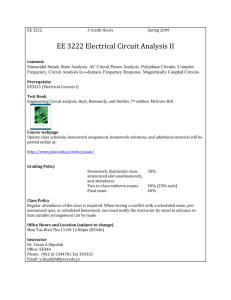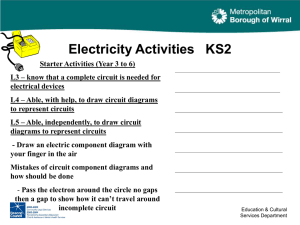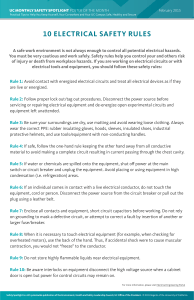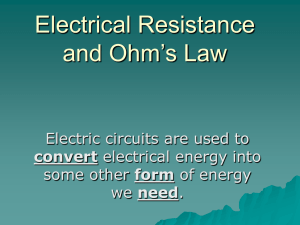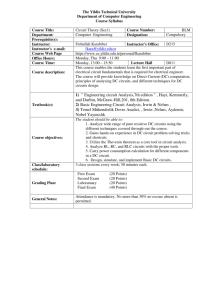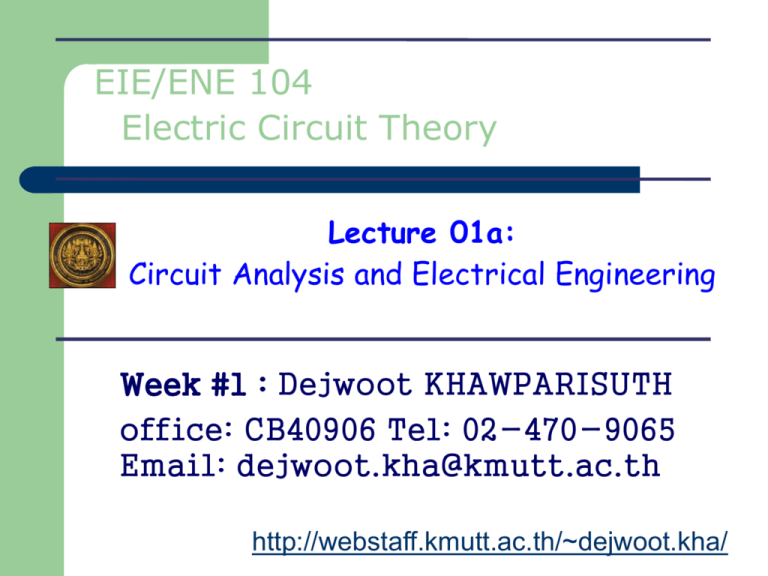
EIE/ENE 104
Electric Circuit Theory
Lecture 01a:
Circuit Analysis and Electrical Engineering
Week #1 : Dejwoot KHAWPARISUTH
office: CB40906 Tel: 02-470-9065
Email: dejwoot.kha@kmutt.ac.th
http://webstaff.kmutt.ac.th/~dejwoot.kha/
Evaluations:
Page 2
Hw 5%
➔ Quiz 15% (open book/no computer)
➔ Midterm 30% (closed book)
Hw
Quiz
➔ Final 50% (closed book)
➔
Midterm
Note: absent from class > 2 => Fa
5%
Final
15%
50%
30%
ENE 104 Electric Circuit Theory
Week#1
Course Description:
Page 3
Electrical units and definitions: Voltage, current,
power, energy, circuit elements: resistors, capacitors,
inductors, independent and dependent sources, lumped
circuits, Wye-Delta transformation. Circuit Theory and
analysis methods: Kirchhoff’s Laws, voltage and current
divider, node and mesh analysis, Thevenin and Norton
theorem, maximum power transfer, superposition
theorem, two port circuits analysis. Sinusoidal Steady
State Analysis: sinusoid properties, complex number
representations, phasors, circuit theory and analysis
method in AC circuits, power calculations, 3 phase AC
circuits analysis.
ENE 104 Electric Circuit Theory
Week#1
Textbooks:
Page 4
William H. Hayt, Jr., Jack E. Kemmerly, Steven
M. Durbin “Engineering Circuit Analysis”,
Sixth edition, McGraw-Hill, 2002.
http://highered.mcgraw-hill.com/sites/0072283645/
ENE 104 Electric Circuit Theory
Week#1
Textbooks:
Page 5
1. James W. Nilsson, Susan A.
Riedel, “Electric Circuits”
Seventh edition, Addison
Wesley, 2005
2. James W. Nilsson, Susan A.
Riedel, “Introductory Circuits for
Electrical and Computer
Engineering”, First Edition,
Prentice Hall,
URL:
http://www.prenhall.com/nilsson
ENE 104 Electric Circuit Theory
Week#1
Introduction:
Page 6
An engineer must acquire many skills,
one of which is knowledge of
electric circuit analysis.
Electrical Engineering:
Concerned with the systems that
- produce
- transmit
- measure
Electric signals
ENE 104
Circuit Analysis and Electrical Engineering
Week#1
Introduction:
Page 7
Five major classifications of electrical
systems:
1. communication system
2. computer systems
3. control systems
4. power systems
5. signal-processing systems
=> Analyze and design
ENE 104
Circuit Analysis and Electrical Engineering
Week#1
Introduction:
Page 8
Circuit theory:
A field as diverse as electrical engineering
Electric circuits: common for EE. :
A mathematical model, which approximates
the behavior of an actual electric system
ENE 104
Circuit Analysis and Electrical Engineering
Week#1
Introduction:
Page 9
Three basic assumptions permit us to use circuit
theory: (rather than electromagnetic field theory)
1. Electric effects happen instantaneously
through out a system: electric signals travel
at or near the speed of light. A system which
is small enough so that we can make this
assumption is called “a lumped-parameter
system”
2. The net charge on every component in the
system is always zero.
3. There is no magnetic coupling between the
components in a system.
ENE 104
Circuit Analysis and Electrical Engineering
Week#1
Overview:
Page 10
Linear circuit analysis:
• Resistive circuit analysis: introduce a number
of very powerful techniques, such as nodal
analysis, mesh analysis, superposition, etc.
• time-domain analysis: allow capacitors and
inductors to be included in a circuit.
• frequency-domain analysis: transform
differential equations into more easily managed
algebraic equations.
ENE 104
Circuit Analysis and Electrical Engineering
Week#1
Relationship:
Page 11
Relationship of Circuit Analysis to Engineering:
Learning how to analyze a problem.
To learn how to
•To be methodical
•To determine the goal of a particular problem
•To work with the information given to develop
a plan of attack
•To implement the plan to obtain a solution
•To verify that the proposed solution is accurate
ENE 104
Circuit Analysis and Electrical Engineering
Week#1
Analysis and Design:
Page 12
This text is focused on developing our
ability to analyze and solve problem.
Developing our design skills comes less
naturally to us than developing our analytical
skills.
ENE 104
Circuit Analysis and Electrical Engineering
Week#1
Computer-Aided Analysis:
Page 13
Modern circuit analysis software is rapidly
increasing in its level of integration.
We need to have a solid understanding of
how circuits work in order to develop an ability
to design them.
ENE 104
Circuit Analysis and Electrical Engineering
Week#1
Problem-Solving:
Page 14
A suggested problemsolving flow chart
W.H. Hayt, Jr., J.E. Kemmerly, S.M. Durbin, Engineering Circuit
Analysis, Sixth Edition.
Copyright ©2002 McGraw-Hill. All rights reserved.
ENE 104
Circuit Analysis and Electrical Engineering
Week#1
Problem-Solving:
Page 15
Develop the skills to successfully attack the
unsolved problems
1. Identify what’s given and what’s to be found
2. Sketch a circuit diagram or other visual model
- label, reference, redraw to simple form
- simplified
3. Think of several solution methods and a way of
choosing among them
4. Calculate a solution
- paper and pencil
- calculator
5. Use your creativity
6. Test your solution
ENE 104
Circuit Analysis and Electrical Engineering
Week#1
ENE 104
Electric Circuit Theory
Lecture 01b:
Basic Components and Electric Circuits
Week#1: Dejwoot KHAWPARISUTH
http://webstaff.kmutt.ac.th/~dejwoot.kha/
Objectives:
Page 17
• Definition of basic electrical quantities and
associated units
• The relationship between charge, current,
voltage, and power
• The passive sign convention
• Dependent and independent voltage and
current sources
• The behavior of the resistor and Ohm’s law
ENE 104
Basic Components and Electric Circuits
Week#1
Units and Scales:
ENE 104
Basic Components and Electric Circuits
Page 18
Week#1
Units and Scales:
ENE 104
Basic Components and Electric Circuits
Page 19
Week#1
Charge:
Page 20
dq
i
dt
ENE 104
Basic Components and Electric Circuits
Week#1
Current:
Page 21
Two different methods of labeling the same current.
(a, b) Incomplete, improper, and incorrect definitions of a current.
(c) the correct definition of i1(t).
ENE 104
Basic Components and Electric Circuits
Week#1
Current:
ENE 104
Page 22
Basic Components and Electric Circuits
Week#1
Voltage:
Page 23
(a, b) These are inadequate definitions of a
voltage. (c) A correct definition includes
both a symbol for the variable and a plusminus symbol pair.
ENE 104
(a, b) Terminal B is 5 V positive with
respect to terminal A; (c, d)
terminal A is 5 V positive with
respect to terminal B.
Basic Components and Electric Circuits
Week#1
Power:
Page 24
If the current arrow is directed into the “ +” marked terminal of
an element, then p = vi yields the absorbed power. A
negative value indicates that power is actually being
generated by the element.
If the current arrow is directed out of the “ +” terminal of an element,
then p = vi yields the supplied power. A negative value in this case
indicates that power is actually being absorbed instead of generated.
ENE 104
Basic Components and Electric Circuits
Week#1
Power:
Page 25
Compute the power absorbed by each part.
ENE 104
Basic Components and Electric Circuits
Week#1
Power:
Page 26
Compute the power absorbed by each part.
ENE 104
Basic Components and Electric Circuits
Week#1
Sources:
Page 27
Symbol for: (a) DC voltage source;
(b) battery; (c) ac voltage source.
Symbol for an
independent current
source.
The four different types
of dependent sources:
(a) current-controlled
current source;
(b) voltage-controlled
current source;
(c) voltage-controlled
voltage source;
(d) current-controlled
voltage source.
ENE 104
Basic Components and Electric Circuits
Week#1
Example:
Page 28
In the circuit below ,if v2 is known to be 3 V, find vL .
ENE 104
Basic Components and Electric Circuits
Week#1
Example:
Page 29
Find the power absorbed by each element in the circuit below.
ENE 104
Basic Components and Electric Circuits
Week#1
The MOSFET:
ENE 104
Basic Components and Electric Circuits
Page 30
Week#1
Network and Circuits:
Page 31
The interconnection of two or more
simple circuit elements forms and electrical
network. If the network contains at least one
closed path, it is also an electric circuit.
ENE 104
Basic Components and Electric Circuits
Week#1
Ohm’s Law:
Page 32
v = i R
or
v
i =
R
ENE 104
Basic Components and Electric Circuits
Week#1
Ohm’s Law:
Page 33
passive element: R, L, C
active element: sources
ENE 104
Basic Components and Electric Circuits
Week#1
Example:
Page 34
Determine the power being absorbed by each
of the circuit elements shown
ENE 104
Basic Components and Electric Circuits
Week#1
Example:
ENE 104
Page 35
Basic Components and Electric Circuits
Week#1
Homework:
ENE 104
Circuit Analysis and Electrical Engineering
Page 36
Week#1
Reference:
Page 37
W.H. Hayt, Jr., J.E. Kemmerly, S.M. Durbin, Engineering Circuit Analysis, Sixth Edition.
Copyright ©2002 McGraw-Hill. All rights reserved.
ENE 104
Circuit Analysis and Electrical Engineering
Week#1

